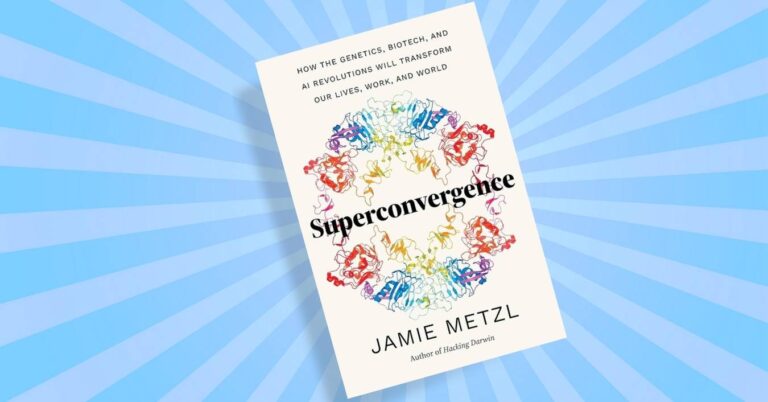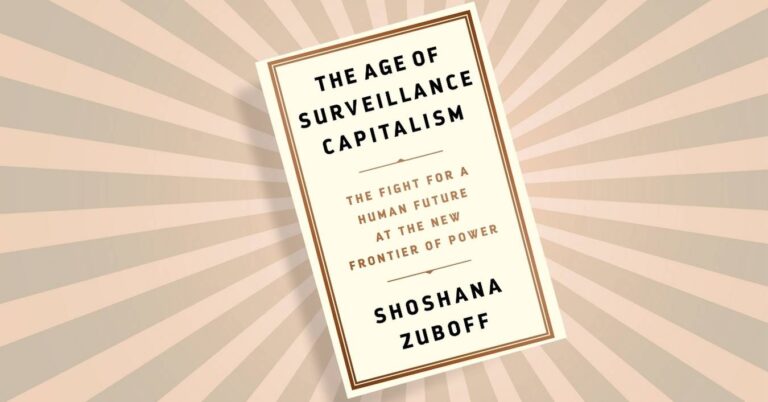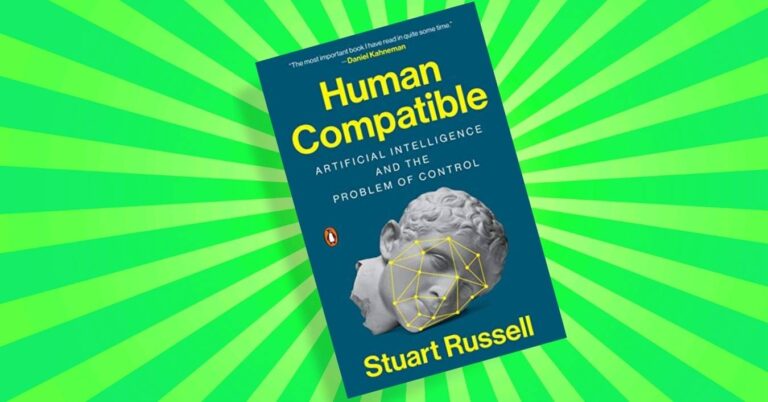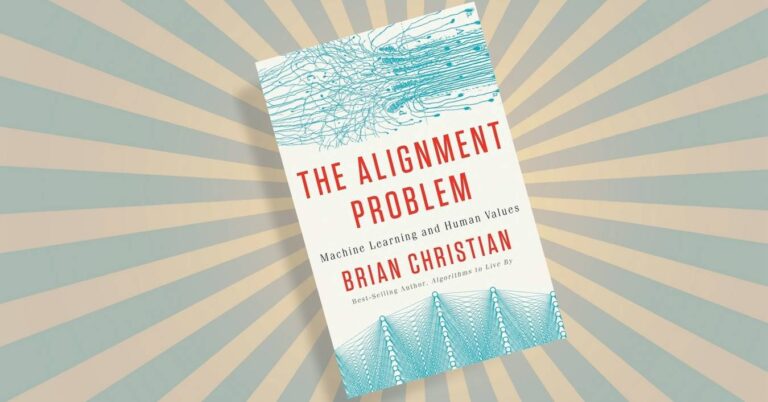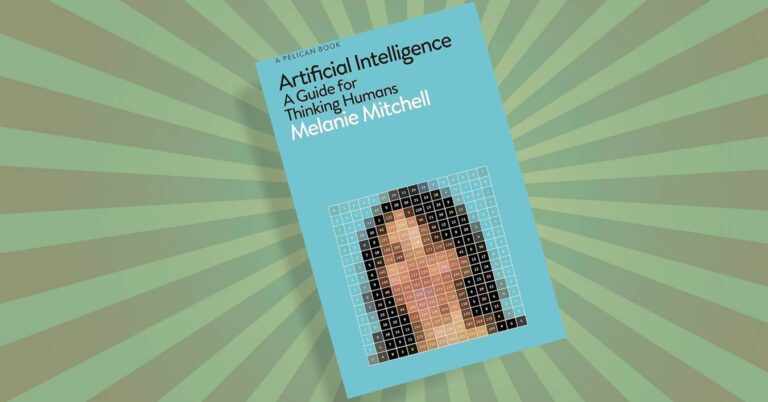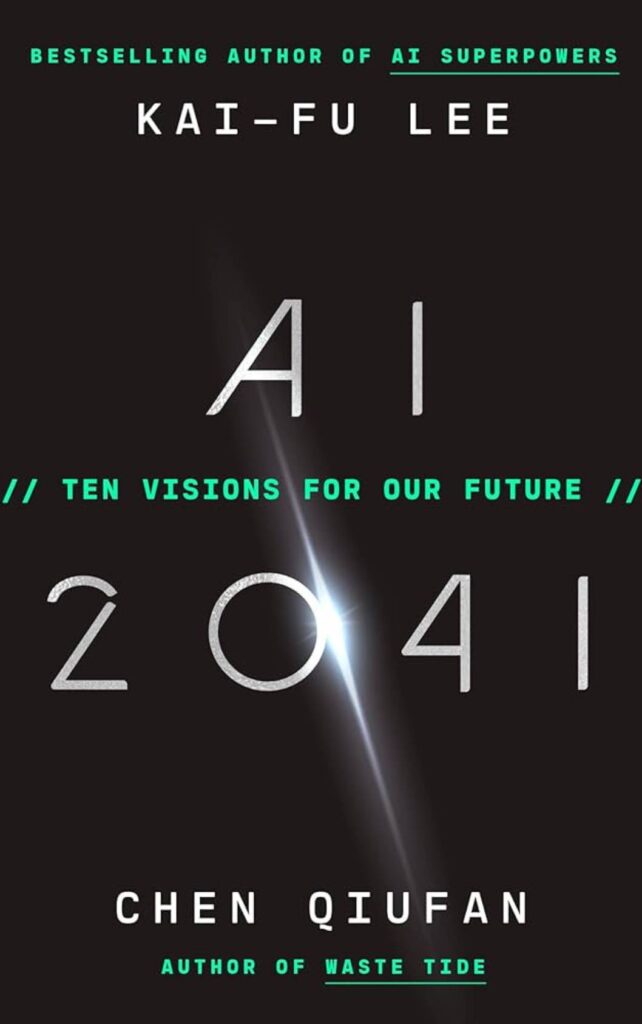
“AI 2041: Ten Visions for Our Future” by Kai-Fu Lee and Chen Qiufan explores the future of AI through ten speculative narratives, that combine fiction and non-fiction.
Each story in “AI 2041” is based on technologies that are highly likely to exist by the year 2041, grounded in the authors’ extensive experience in AI research and development. Each story is accompanied by an analysis of the technological, economic, and societal implications of AI advancements.
The book not only presents a vision of the future but also serves as a guide for preparing for the upcoming changes brought about by AI advancements.
Key Takeaways, Insights, and Views
- AI in Daily Life
- AI will become deeply integrated into everyday activities, from personalized education to healthcare.
- Technologies like facial recognition, autonomous vehicles, and AI-driven diagnostics will be commonplace.
- Economic Impacts
- AI will significantly impact job markets, creating new opportunities while displacing some traditional roles.
- Emphasizes the importance of reskilling and adapting to new job landscapes.
- Ethical and Societal Considerations
- Raises critical ethical issues, including privacy, surveillance, and bias in AI algorithms.
- Discusses the need for robust ethical frameworks and regulations.
- Global Disparities
- AI has the potential to both bridge and widen global inequalities.
- Highlights the importance of inclusive AI policies to ensure equitable benefits.
- Technological Advances
- Predicts advancements in natural language processing, quantum computing, and AI-human collaboration.
- Envisions AI that can understand and generate human-like responses and solve complex problems.
- Healthcare Innovations
- AI will revolutionize healthcare through predictive analytics, personalized treatment plans, and improved diagnostic tools.
- Discusses the potential for AI to extend human lifespan and enhance quality of life.
- Education Transformation
- Personalized AI tutors will provide tailored learning experiences.
- AI-driven education platforms will support lifelong learning and skill development.
- Environmental Impact
- AI technologies can aid in addressing climate change through optimized resource management and environmental monitoring.
- Emphasizes the role of AI in creating sustainable practices.
- Future of Work
- Explores the shift towards gig economies and the rise of AI-driven platforms for freelancing and remote work.
- Advocates for policies that support workers in transition.
- Human-AI Symbiosis
- Envisions a future where humans and AI coexist symbiotically, enhancing each other’s capabilities.
- Discusses the philosophical implications of AI-human integration.
Core Concepts
| Concept | Explanation | Importance |
|---|---|---|
| AI Integration | AI embedded in everyday life activities. | Demonstrates the pervasive impact of AI on daily routines and societal functions. |
| Economic Impact | Changes in job markets and economic structures due to AI. | Highlights the need for adaptation and reskilling in the workforce. |
| Ethical Frameworks | Guidelines for responsible AI development and use. | Ensures AI technologies are developed and deployed ethically and safely. |
| Global Inequality | Potential for AI to bridge or widen economic and social disparities. | Stresses the need for inclusive policies to ensure equitable AI benefits. |
| Technological Advances | Progress in AI capabilities like NLP and quantum computing. | Prepares society for future technological breakthroughs and their applications. |
| Healthcare Innovations | AI’s role in improving healthcare delivery and outcomes. | Emphasizes AI’s potential to transform medical practice and patient care. |
| Education Transformation | Personalized and adaptive learning through AI. | Illustrates the potential for AI to revolutionize education and skill development. |
| Environmental Impact | AI’s role in promoting sustainability and combating climate change. | Highlights AI’s potential to address environmental challenges and promote sustainable practices. |
| Future of Work | Changes in work patterns and job structures due to AI. | Prepares for shifts in employment and the rise of new work models. |
| Human-AI Symbiosis | Cooperative existence and enhancement between humans and AI. | Discusses the philosophical and practical implications of AI-human integration. |
Deeper Explanations of Important Topics
AI Integration in Daily Life
- Explanation: AI technologies will seamlessly integrate into daily activities, from smart home devices to AI-driven personal assistants that anticipate needs and preferences. This integration will enhance convenience, efficiency, and personalization in everyday life.
- Importance: Understanding AI’s role in daily life helps prepare for a future where technology enhances human experiences and capabilities, ensuring a smooth transition and maximizing benefits.
Ethical Frameworks for AI
- Explanation: Ethical frameworks are guidelines designed to govern the development, deployment, and use of AI technologies. These frameworks address issues such as privacy, bias, transparency, and accountability to ensure AI systems are fair and just.
- Importance: Establishing ethical frameworks is crucial to prevent misuse and unintended consequences of AI, promoting trust and ensuring that AI technologies benefit all members of society equitably.
Actionable Insights
- Stay Informed and Educated
- Keep up with the latest advancements in AI through courses, seminars, and literature.
- Engage with AI communities and forums to exchange knowledge and ideas.
- Advocate for Ethical AI Practices
- Support policies and initiatives that promote ethical AI development.
- Encourage transparency and accountability in AI systems within your organization.
- Prepare for Economic Shifts
- Invest in reskilling and upskilling to remain relevant in the evolving job market.
- Explore opportunities in emerging fields created by AI advancements.
- Embrace AI in Healthcare
- Stay informed about AI-driven healthcare innovations and their potential benefits.
- Support the adoption of AI tools that improve patient care and outcomes.
- Promote Environmental Sustainability
- Advocate for and adopt AI technologies that contribute to environmental sustainability.
- Participate in initiatives that leverage AI to address climate change and resource management.
Quotes from "AI 2041: Ten Visions for Our Future"
- “AI will become as integral to our daily lives as electricity and the internet.”
- “The future of work will be shaped by our ability to adapt and reskill in an AI-driven economy.”
- “Ethical AI development is not just a necessity; it is our responsibility.”
- “AI has the potential to bridge global inequalities if we adopt inclusive policies.”
- “Human and AI symbiosis will redefine our understanding of intelligence and capability.”
This summary of “AI 2041: Ten Visions for Our Future” by Kai-Fu Lee and Chen Qiufan, is part of our series of comprehensive summaries of the most important books in the field of AI. Our series aims to provide readers with key insights, actionable takeaways, and a deeper understanding of the transformative potential of AI.
To explore more summaries of influential AI books, visit this link.


